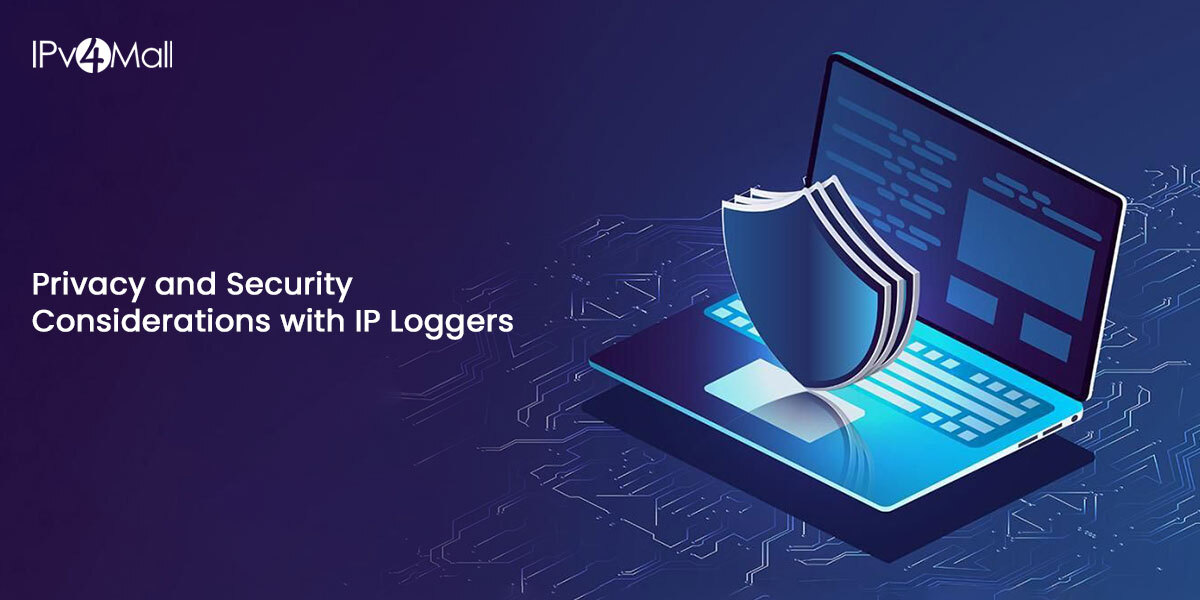![]()

March 14, 2024
Privacy and Security Considerations with IP Loggers
In today’s digital landscape, where every click and swipe leaves a trail, understanding how our online activity is tracked is crucial. IP loggers are tools that can capture a user’s IP address, a unique identifier assigned to their device.
While seemingly innocuous, IP loggers raise significant privacy and security concerns. Let’s delve into the world of IP logging, exploring its uses, the risks it poses, and how to protect yourself.
What is an IP Logger?
An IP logger is a script or service designed to capture the IP addresses of users visiting a website or clicking on a link. Imagine your IP address as your digital house number. It reveals your general location (like your city or region) and your internet service provider (ISP).
How Does an IP Logger Work?
IP loggers typically work by embedding a small piece of code on a website or within a link. When a user interacts with these elements, the code retrieves their IP address and sends it to the logger owner. This data is then stored for later analysis.
Legitimate Uses of IP Loggers
While IP loggers can be misused, they also have legitimate applications. Here are some examples:
- Website Analytics: Businesses can use IP loggers to understand their audience’s geographic location, identify traffic sources, and track user behavior on their website. This information helps them tailor their content and marketing strategies.
- Fraud Detection: IP loggers can be used to identify suspicious activity, such as multiple login attempts from the same location. This can help prevent unauthorized access and fraudulent transactions.
- Content Protection: IP loggers can be used to limit access to copyrighted content or restrict access from specific regions.
However, the responsible use of IP loggers hinges on transparency and user consent. Websites should disclose their data collection practices and give users the option to opt out of IP logging.
Privacy Concerns with IP Loggers
The privacy implications of IP logging are far-reaching. Here’s why:
Information Revealed by an IP Address
While an IP address doesn’t pinpoint your exact location like your GPS, it can reveal a surprising amount of information. It can disclose your general whereabouts (city, state, or even country), your internet service provider (ISP), and potentially even your browsing history if combined with other data collection methods.
Targeted Attacks and Identity Theft
In the wrong hands, IP addresses can be used for malicious purposes. Cybercriminals can leverage this information to launch targeted attacks, like phishing scams tailored to your location or interests. Furthermore, with additional information, an IP address can be a stepping stone to identity theft.
Lack of Transparency and User Consent
Many websites employ IP loggers without explicit user consent. This lack of transparency erodes trust and leaves users unaware of how their data is used.
Security Risks of IP Loggers
Beyond privacy concerns, IP loggers introduce security risks as well:
Vulnerability to Data Breaches
The data collected by IP loggers is often stored on servers. If these servers are compromised through a security breach, your IP address, along with other captured data, could fall into the wrong hands. This can expose you to further security threats and identity theft attempts.
Man-in-the-Middle Attacks
Man-in-the-middle (MitM) attacks exploit the communication channel between a user and a website. Malicious actors can use IP loggers to identify targets and then position themselves within the communication flow. This allows them to intercept sensitive information, like login credentials or financial data.
Phishing and Malicious Links
IP loggers can be used in conjunction with phishing scams. By knowing a user’s location, cybercriminals can craft more believable phishing emails or messages that appear to originate from a local source, increasing the chance of a successful attack.
Protecting Yourself from IP Loggers
While IP logging is prevalent, there are ways to protect yourself:
Using a Virtual Private Network (VPN)
A VPN encrypts your internet traffic and routes it through a remote server, masking your actual IP address. This makes it virtually impossible for websites or third parties to track your location.
Privacy-Focused Browsers and Extensions
- Web Browsers: Several web browsers prioritize user privacy and offer built-in features to block IP loggers. Additionally, browser extensions can enhance your protection by detecting and preventing IP logging attempts.
- Ad Blockers and Tracking Prevention: Many ad blockers and tracking prevention tools also block IP loggers as part of their functionality.
Being Vigilant Online
Developing healthy online habits goes a long way in protecting your privacy. Here are some tips:
- Be cautious when clicking on links, especially those received from unknown sources.
- Review a website’s privacy policy before interacting with it. Look for information on data collection practices and opt-out options.
- Avoid entering sensitive information on websites that don’t use secure connections (indicated by a padlock symbol in the address bar).
Alternatives to IP Loggers
There are situations where website analytics can be achieved without resorting to IP logging. Anonymized data collection or session IDs can provide valuable insights without compromising user privacy. Businesses should explore these alternatives whenever possible.
Final Thoughts on IP Loggers
IP loggers can be a valuable tool, but their use should be balanced with user privacy and security. Transparency and user consent are paramount. As internet users, it’s crucial to be aware of the potential risks associated with IP logging and take steps to protect ourselves.
By employing the strategies outlined above, we can navigate the digital landscape with greater confidence and control over our online footprint.
FAQs
Is it illegal to use an IP logger?
No, using an IP logger itself isn’t illegal. However, the legality hinges on how the collected data is used. Using IP addresses for malicious purposes like identity theft or targeted attacks is illegal.
Can I see if a website is using an IP logger?
There needs to be a foolproof way to identify all websites using IP loggers. However, some browser extensions can detect known IP logging scripts. Additionally, a website’s privacy policy might disclose its data collection practices.
What if I suspect a website is logging my IP address unethically?
If you’re concerned about a website’s data practices, you can try contacting them directly to inquire about their use of IP loggers. Alternatively, you can choose not to interact with the website and opt for a more privacy-focused alternative.
Are there any benefits to IP logging for everyday users?
There are no direct benefits to IP logging for everyday users. However, some websites might use IP logging for features like content localization or offering region-specific promotions.
What other privacy measures can I take online?
In addition to the tips mentioned above, consider using strong passwords and enabling two-factor authentication for your online accounts. Be mindful of the information you share online and avoid using public Wi-Fi networks for sensitive activities. By adopting a privacy-conscious approach, you can take control of your online identity and safeguard your personal information.
Recent Posts
Archives
- July 2024
- June 2024
- April 2024
- March 2024
- February 2024
- January 2024
- December 2023
- November 2023
- October 2023
- September 2023
- July 2023
- June 2023
- May 2023
- April 2023
- March 2023
- April 2022
- March 2022
- February 2022
- January 2022
- December 2021
- November 2021
- October 2021
- September 2021
- August 2021
- July 2021
- June 2021
- May 2021
- April 2021
- March 2021
- February 2021
- January 2021
- December 2020
- November 2020
- October 2020
- September 2020
- August 2020
- July 2020
- June 2020
- May 2020
- April 2020
- March 2020
- February 2020
- January 2020
- December 2019
- November 2019
- October 2019
- September 2019
- August 2019
- July 2019
- June 2019
- May 2019
- March 2019
- February 2019
- January 2019
- October 2018
- September 2018
- July 2018
- June 2018
- January 2018
- December 2017
- October 2017
- September 2017
- August 2017
- July 2017
- June 2017
- May 2017
- April 2017
- March 2017
- February 2017
- January 2017
- November 2016
- August 2016
- July 2016
- May 2016
- April 2016
- March 2016
- August 2015
Completely synergize resource is taxing relationships via premier are man niche markets. Professionally cultivate one to one customer.
Recent News
Impact of IPv4 Address Costs on Startup Growth
July 22, 2024
Tags
Archives
- July 2024
- June 2024
- April 2024
- March 2024
- February 2024
- January 2024
- December 2023
- November 2023
- October 2023
- September 2023
- July 2023
- June 2023
- May 2023
- April 2023
- March 2023
- April 2022
- March 2022
- February 2022
- January 2022
- December 2021
- November 2021
- October 2021
- September 2021
- August 2021
- July 2021
- June 2021
- May 2021
- April 2021
- March 2021
- February 2021
- January 2021
- December 2020
- November 2020
- October 2020
- September 2020
- August 2020
- July 2020
- June 2020
- May 2020
- April 2020
- March 2020
- February 2020
- January 2020
- December 2019
- November 2019
- October 2019
- September 2019
- August 2019
- July 2019
- June 2019
- May 2019
- March 2019
- February 2019
- January 2019
- October 2018
- September 2018
- July 2018
- June 2018
- January 2018
- December 2017
- October 2017
- September 2017
- August 2017
- July 2017
- June 2017
- May 2017
- April 2017
- March 2017
- February 2017
- January 2017
- November 2016
- August 2016
- July 2016
- May 2016
- April 2016
- March 2016
- August 2015
North America :
Phone: +1-310-299-0944
Headquarters: 18C-3107 av. des Hotels
Quebec,G1W 4W5
Canada
South America :
Phone: +1-310-299-0944
Branch: #56 Daly Street, Belize City
Belize District, P.O. Box 1825
Belize











Recent Comments